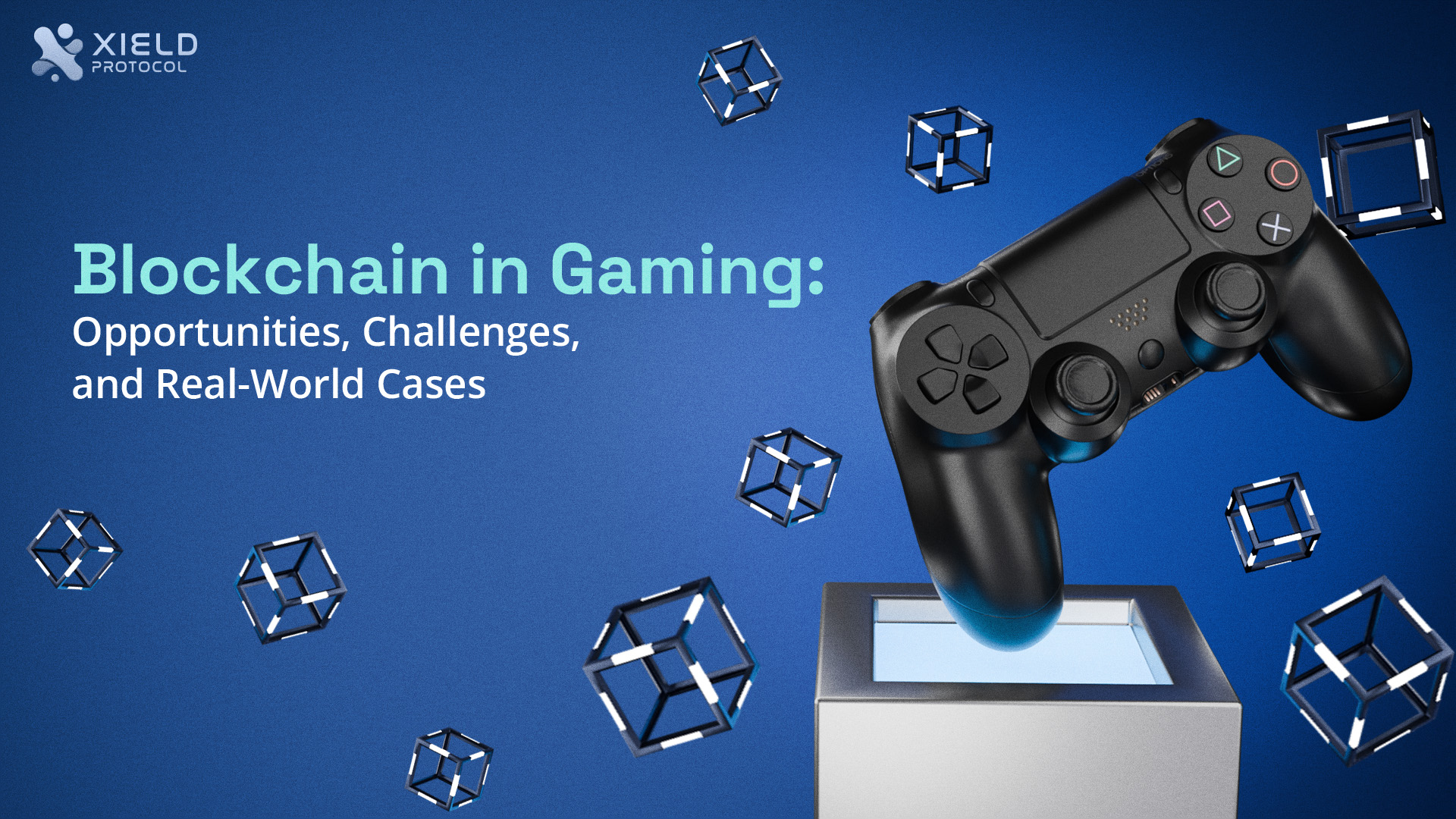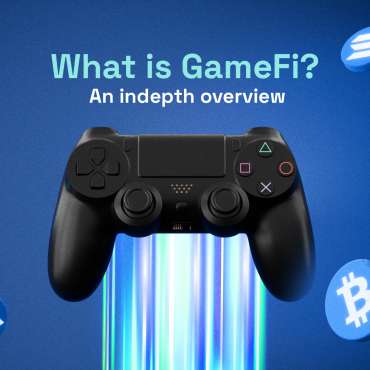Cryptocurrency has been around for almost a decade, but it has only lately received investment attention. Gaming, on the other hand, has been a driving force behind broad cryptocurrency adoption. Gaming has always been at the forefront of technological innovation, and the industry’s blockchain embrace might pave the road for wider acceptance.
Due to the frequent crossover in the usage of virtual tokens and assets in games, gamers now have more access to this technology. With over three billion active video gamers, blockchain adoption in gaming has the potential to expand the use of cryptocurrency. Throughout this blog, we’ll look at how blockchain gaming helps players in various ways and boost their gaming experience.
Gaming and cryptocurrency: an ideal partnership
In truth, gaming and cryptocurrency have kept pace with each other. Both firms appeal to a similar clientele of tech-savvy folks who are aware of digital currencies and are constantly looking for the next great thing. Furthermore, gaming is at the forefront of innovation, and cryptocurrency is an obvious next step for the industry.
Cryptocurrency offers a variety of advantages to the gaming industry, including faster transactions, lower prices, and improved security. Furthermore, blockchain adoption gaming provides a great platform for the broad use of cryptocurrency. Blockchain for online gamers is already familiar with digital money and virtual economies, so embracing cryptocurrency would be a natural next step.
What is blockchain gaming?
Blockchain games are simply those that use components of blockchain technology. In certain circumstances, in-game objects are coined as NFTs, which players may trade or sell to others. These games frequently employ digital assets as in-game money, and players can occasionally earn cryptocurrency by completing levels.
These games allow players to own the goods they acquire as they play. Unlike traditional games, blockchain games are less likely to lose in-game objects. In November 2022, for example, Call of Duty Warzone 2.0 servers lacked performance and crashed often, leading players to lose their stuff. If this game had employed blockchain technology, these products might have been minted as NFTs, assuring their continued existence in users’ wallets.
Blockchain games can also improve player security since they employ encrypted ledgers to store player account data. Traditional online video games are vulnerable to hacking, and users’ personal information can be compromised.
Blockchain gaming’s impact
Blockchain games’ popularity has skyrocketed over the last decade. Dapp Radar reports that approximately 20 million gaming transactions occur per day across all prominent blockchain protocols. This is more transactions than all other blockchain use cases combined. Despite this, the total volume is significantly lower than that of financial dApps.
Blockchain-based games provide players with a feasible means of earning money while playing. Axie Infinity and other play-to-earn games allow users to breed and train NFT animals, which they can sell for digital currency. Although most gamers will not become wealthy, the profit possibility is appealing to those who enjoy gaming. Blockchain games can provide creators with new revenue streams by creating real-world scarcity for their in-game goods. Furthermore, video game makers can receive royalties on secondary sales of their gaming assets.
Blockchain Technology is Benefiting the Gaming Industry in Five Ways, Including:
Decentralized autonomous organizations (DAOs)
It has enabled gaming communities to engage in their favorite games thanks to the introduction of blockchain technology. DAOs have democratized gaming by empowering gamers to participate in the development and management of their games.
Gamers may join DAOs to vote on ideas and influence game governance and future decisions. They gain extra benefits by joining the DAO, including early access to contests, new features, and participation incentives.
This ability to actively govern the games they play fosters a feeling of community inside the game’s ecosystem. As a result, gamers are more happy and devoted to the games they play, fostering stronger relationships with others.
To participate in a DAO, the player must own the community’s native token. This acts as a portal to the world of cryptocurrency. Following that, gamers are more likely to be engaged and participate in additional crypto initiatives, establishing themselves as crypto users.
Play to earn
Play-to-earn (P2E) gaming is here. Furthermore, its finest concept is a major incentive for new blockchain adoption among participants. In traditional gaming, players only earn awards after reaching certain milestones or completing given tasks.
However, blockchain gaming enables players to earn money just by spending time playing the game. Earning while playing has created a whole new universe of opportunities for gamers, even though gaming is expensive.
First, revenues minimize the cost of playing the games, giving players an additional incentive to keep playing. In rare cases, when players optimize their games, the revenues outweigh the expenditures, resulting in a profit for the gamer.
As a result, several players have developed great careers doing what they like: gaming. This has attracted more gamers who want to make money by playing video games, resulting in more cryptocurrency users.
Ownership of in-game assets
Before the widespread use of blockchain technology in gaming, gamers had no genuine ownership of any commodities gained within the virtual worlds of their favorite games.
However, the blockchain’s distributed ledger and non-fungible tokens (NFTs), which serve as the foundation for blockchain games, enable players to hold in-game assets. NFTs enable players to not only ascribe monetary worth to their in-game assets but also swap them for cryptocurrencies or other NFTs.
As a result, players are motivated to collect in-game assets, if not for their beauty and use in the game, then for trading due to their value. This has created an ecosystem inside the blockchain gaming business that attracts both investors and new participants.
Interoperability
Blockchain gaming firms can blur the line between real and digital, as well as conceal the borders between game worlds. Blockchain usage has enabled interoperability and cross-operability amongst blockchain games.
Gamers may use blockchain adoption to transfer assets across games, not only for trading but also for use in the gameplay experience.
Among the several benefits of blockchain gaming, interoperability is likely the most interesting. In 2022, Linkin Park co-founder Mike Shinoda tweeted, “Imagine taking your favorite Valorant skin and using it [in] Fortnite.” And you don’t have to pay anything more since you own it. Then use it in CoD, Minecraft, Twitter, and Instagram.”
Interoperability between gaming worlds has created a gaming multiverse in which the value of a gamer’s assets is constant or even increases. This has also expanded the possibilities for gaming assets, raising the value of NFTs and having an impact on the whole cryptocurrency industry.
Metaverse
The metaverse is an idea that originated as a way to extend the game industry by creating an immersive virtual environment in which players may exist as their favorite characters. The concept, however, has expanded beyond its initial purpose and has become an important entrance point for corporate groups into the cryptocurrency market.
Led by Facebook, which later rebranded to Meta after opting to focus on the metaverse, various other companies have joined the field, trying to establish themselves in virtual reality.
The metaverse also pioneered the idea of virtual real estate, which can be bought, sold, and developed. The notion has grown in popularity among both individual and institutional investors, resulting in an increased demand for virtual land and property.
Challenges in Blockchain Gaming
While the potential benefits of blockchain gaming are clear, several challenges must be overcome before widespread adoption:
Scalability
Scalability issues exist in blockchain networks such as Ethereum, resulting in slow transaction rates and high fees. This may disturb the smooth gameplay experience that players expect.
User Experience
Blockchain-based games may be challenging for beginners due to wallet upkeep, gas expenses, and the need to understand blockchain technology. To reach a wider audience, game developers must consider user experience.
Regulation
The legal and regulatory landscape around blockchain adoption and NFTs is constantly shifting. Game developers must navigate these hazy waters to comply with regional regulations.
Sustainability
The energy consumption of several blockchain networks, particularly proof-of-work systems, has raised environmental concerns. Developers are seeking more environmentally friendly alternatives.
Few Real-World Examples of the Best Blockchain Games
Blockchain games are essentially video games that utilize blockchain technology. In other words, they are constantly within the blockchain, and the whole cluster of systems participating in the game has a copy of it. They let users buy and trade cryptocurrencies, NFT games, and other blockchain-related assets with other players via the internet. Some of the most popular blockchain games include:
Axie Infinity
Axie Infinity is a game built on the blockchain. The characters are axies, or NFTs, which may be owned and sold on the blockchain. This has gained in popularity because of its play-to-earn model, which allows users to earn tokens just by participating in the game. Many players, particularly those from underdeveloped countries, now rely significantly on the game’s economy to make a living.
CoinFantasy
CoinFantasy is one of the first platforms to operate in the blockchain gaming space, combining the motivating experience of the industry’s finest play-to-earn blockchain gaming principles with the ongoing integration of current technology. Thus, by fixing various faults within the game system, as well as returning control to users and subjugating creators, CoinFantasy offers a decentralized gaming experience. The use of blockchain technology enhances the realism of the game, allowing players to sell or trade tokens as owned in the game.
CryptoKitties
CrytoKittes, published in November 2017, is one of the world’s first attempts to create a blockchain-based game. Players may either trade their kittens on the open market or keep them until they grow valuable. Each cat’s personality is defined by genes that reflect diverse features, including hair patterns and eye shape, base color, and accessory color.
Closing Thoughts
As blockchain gaming expands and gains popularity in the entertainment business, it is logical to ponder its future. The future of blockchain gaming is bright, and it is expected to see substantial development and widespread adoption in the next years as more firms embrace blockchain technology. Traditional game producers may incorporate blockchain technology into their games, resulting in increased acceptance of the technology.
Future blockchain-based gaming platforms may potentially prioritize interoperability to increase communication among game networks. Players may use their assets across numerous games and platforms, creating a more cohesive gaming experience. The game business, when integrated with blockchain technology, can give players novel and entertaining new experiences, all within a sustainable framework.




